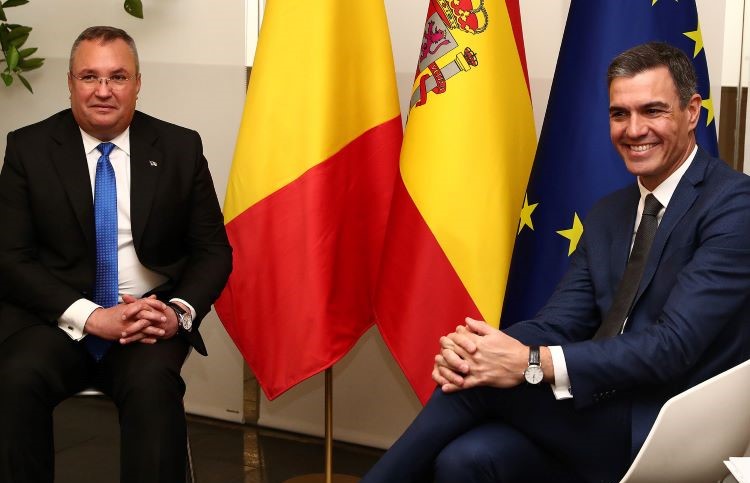The Diplomat
The President of the Government, Pedro Sánchez, and the Prime Minister of Romania, Nicolae Ciucă, chaired yesterday in Castellón de la Plana the first Spanish-Romanian summit, in which both parties agreed on the creation of a working group to address the possible Spanish and Romanian dual nationality.
Apart from Sánchez and Ciucă, the summit brought together the Second Vice President and Minister of Labor and Social Economy, Yolanda Díaz; the Minister of Foreign Affairs, José Manuel Albares; the Spanish Minister of Defense, Margarita Robles; the Spanish Minister of Agriculture, Fisheries and Food, Luis Planas; the Minister of Territorial Policy, Isabel Rodríguez; and the Minister of Health, Carolina Darias, together with their Romanian counterparts.
Sánchez and Ciucă held a bilateral meeting in which they addressed bilateral relations and various issues on the European agenda, such as high energy prices, economic governance, the respective recovery plans and the enlargement of the Schengen area. “The Latin cultural and linguistic ties of Spain and Romania, the friendship of our peoples and the 141 years of diplomatic relations that unite us accredit the strength of an even more intense relationship since Romania’s accession to NATO in 2004 and to the EU in 2007,” said the Prime Minister at the press conference that ended the summit.
They also discussed the impact of the war in Ukraine and expressed their concern for Moldova – a country with close historical and cultural ties to Romania and which is particularly suffering the impact of Putin’s war because of its geographical proximity to Ukraine – and reaffirmed their support for this country in its European horizon. “They need our support and they need to know that we are with them in order to cope with the consequences of this illegal invasion,” said the Romanian prime minister.
The two leaders also discussed defense relations. From October this year until March 2023, Spain has deployed an air surveillance radar and 38 military personnel at the Schitu barracks, and from December 1 until March next year, eight F-18 fighters and 130 military personnel will be deployed in Romania as part of the Black Sea air police mission.
On the other hand, both leaders reaffirmed their commitment to a Europe without internal borders and, in this sense, the President of the Government ratified before the Romanian Prime Minister the support of Spain to the incorporation of Romania to the Schengen area. The Justice and Home Affairs Council of the EU will approve the entry of Romania, Bulgaria and Croatia into the Schengen area on December 8, after the Commission recommended on November 16 that their entry into the European free movement area be approved “without further delay”. The European Parliament gave the green light to Romania’s accession on October 18.
Dual nationality
Likewise, Pedro Sánchez and Nicolae Ciucă discussed the importance of the 1,100,000 Romanians currently residing in Spain, where they represent the largest community of foreigners in our country. “I appreciate the way in which Spain has managed to integrate into society such a high number of Romanians who live, study, work and make their contribution to the Spanish economy,” said the Romanian Prime Minister. For this reason, the two governments reached an agreement yesterday to “create a working group” to study the possibilities of granting Spanish nationality to members of this group “without having to renounce their Romanian nationality of origin”, explained Sánchez at the press conference.
If it goes ahead, Romania would be the second non-Ibero-American country and the third EU country with which Spain has a dual nationality agreement. On March 15, 2021, during the XXVI Spanish-French summit, Pedro Sánchez and the President of the French Republic, Emmanuel Macron, signed the dual nationality agreement, which came into force on April 1 of this year. Until then, Spain only allowed the possibility of acquiring Spanish nationality without renouncing the nationality of origin to citizens of Ibero-American countries and of Andorra, the Philippines, Equatorial Guinea and Portugal (Ibero-American countries are considered for these purposes those in which Spanish or Portuguese is one of the official languages).
The desire of the Romanian community residing in Spain to benefit from dual nationality had been expressed on two occasions by the Romanian Minister of Foreign Affairs, Bogdan Aurescu, before his Spanish counterparts, namely before Arancha González Laya in February 2021 and before José Manuel Albares in Madrid in October of the same year.
Moreover, the two countries yesterday signed a Joint Declaration, in which they pledge to further strengthen their bilateral relations and strengthen their ties in all areas by holding regular bilateral summits, and seven Memoranda of Understanding (MoU) on Labor, Foreign Affairs (to encourage regular political consultations on matters such as political relations, economic, cultural, scientific and consular relations, European policies, NATO, multilateral fora and development cooperation), on collaboration between the Diplomatic Schools, Interior (to reduce the risk of natural disasters in both countries and facilitate emergency operations), Agriculture, Culture and Health. “I reiterate the invitation for the next summit to be held in Bucharest or anywhere in Romania. Why not?” Nicolae Ciucă stated at the press conference.







